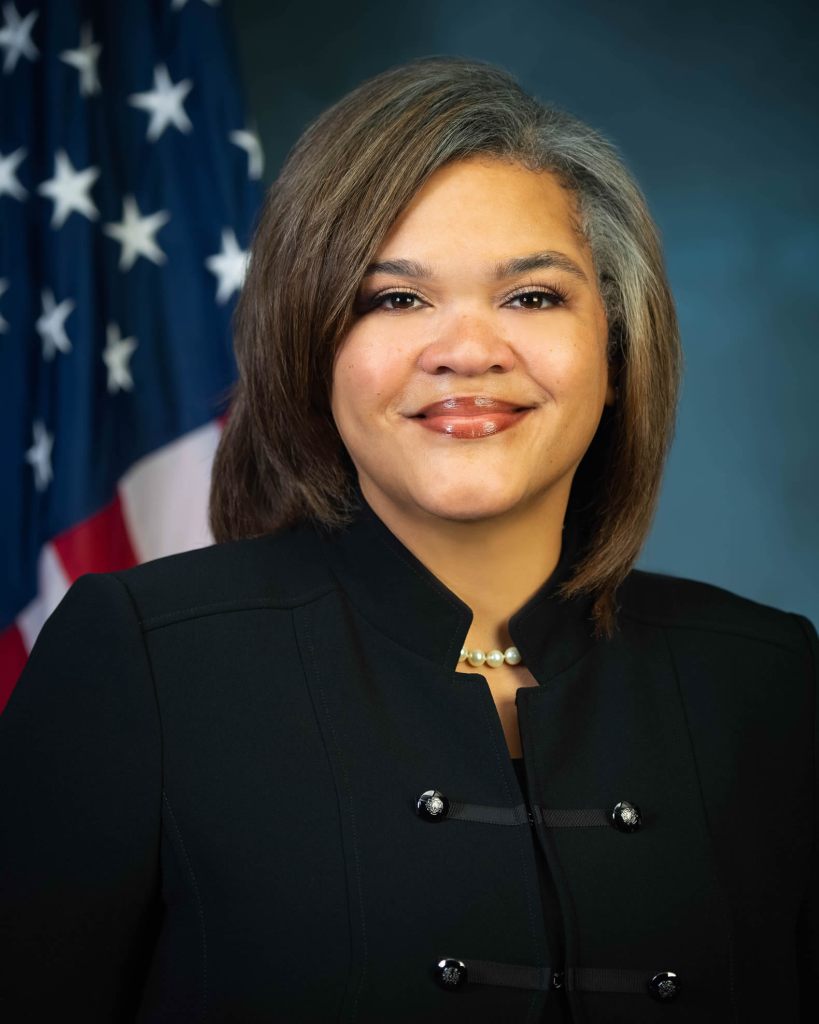Alanna McCargo, president of Ginnie Mae, addressed assembled reverse mortgage professionals while affirming the company’s rock-solid commitment to the Home Equity Conversion Mortgage (HECM)-backed Securities (HMBS) program.
Offering remarks this week in Nashville during the National Reverse Mortgage Lenders Association (NRMLA) Annual Meeting and Expo, McCargo aimed to assure industry participants and investors that the company has prioritized serving the HMBS program even as it grapples with major challenges.
Prioritizing collaboration with the industry and seniors
At the beginning of her remarks, McCargo discussed the level of collaboration Ginnie Mae has had with members of the reverse mortgage industry.
“I’m really glad that we have been able to engage in this market with so many of our industry partners who have made both the HECM program and the HMBS program possible,” she said. “These are important tools and support programs that have really enabled so many of our seniors across the country [to have] the opportunity to stay in their homes, to live in their homes beyond retirement, and have been a source of security, income, and cash flow for the needs that they may have in retirement.”

She explained that challenges faced by seniors as a cohort seeking a stable retirement surpass those in the HECM and HMBS programs.
“[Seniors represent] a population growing at a tremendous pace,” she said. “But not only that, the income and retirement security, and the issue of housing security of our seniors in this country is really a growing challenge for us that that the reverse mortgage industry plays a huge role in. We are doing a lot of work at HUD to address this challenge along every spectrum of the housing continuum, as I call it.”
Before assuming the role of Ginnie Mae’s president, McCargo served as a senior advisor to U.S. Department of Housing and Urban Development (HUD) Secretary Marcia Fudge. She highlighted the issue of serving seniors as a centrally important priority for HUD under Fudge’s leadership.
‘Small programs matter, too’
Although the HMBS program is a comparatively small piece of the wider Ginnie Mae portfolio, McCargo aimed to address potential concerns that it could be perceived as less important within the company or at HUD generally.
“Small programs matter, too,” she said. “And even though this is a smaller program for Ginnie Mae, it’s a critically important one in terms of long-term viability and the security for seniors that we talked about. And that’s why we’re so committed to making sure that even though we’re going through what I think is a stressful cycle for everyone in this business — forward and reverse — I think it’s important that we are doing this together, and that there is a real understanding of the commitment we have long term to this business.”
Demographic trends bear out the importance and utility of the HECM and HMBS programs for seniors, she explained, describing how the population is aging at a more accelerated rate and how widening wealth and wage gaps are exacerbating such problems.
“I would say the data suggests that our retirement crisis is only going to grow from here, especially in the high-cost, high-inflationary environment that we’re in and as incomes try to keep pace with growth,” she said. “So tools and programs like HECM and HMBS [will] really become more important over time.”
Liquidity concerns and reverse mortgage challenges
Traditional mortgage lenders are feeling liquidity pressures, but she explained that investors in the HMBS space face a “uniquely acute” set of challenges, particularly from the interest rate environment.
“We are looking at HMBS volumes that have been declining in reaction to accelerating interest rates, and we also have had stress in the reverse mortgage sector,” she explained. “You’re all familiar with one of the larger reverse mortgage issuers who went bankrupt last year and Ginnie Mae ultimately had to seize that portfolio.”
This led to policies, including a reduction in the required minimum HMBS pool size from $1 million to $250,000 for all pool types, as well as allowing the securitization of multiple participations related to a particular HECM in any one issuance month.
“I cannot express enough — and I hope that helps to hear from me and on behalf of the Biden administration, Secretary Fudge and all of [HUD] and Ginnie Mae — that we think this is a vital program,” she said. “We stand behind this program, and we stand alongside you as we try to face together all the headwinds that are out there.”
Challenges in the space are real, but solvable, she added, and the commitment from the industry and that Ginnie Mae itself has gives McCargo confidence, she shared.
“We’re going to come out on the other side of this as a healthier, better HECM and HMBS program,” she explained.






